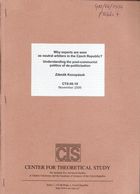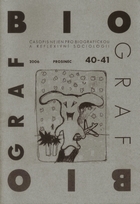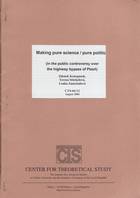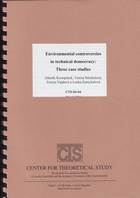KONOPÁSEK, Z. (2008): Expertíza a politika životního prostředí: Případ projektu Natura 2000. CTS Research Reports, CTS-08-02. Praha: CTS. Dostupné na adrese http://www.cts.cuni.cz
::::As sociologists interested in the relationships between expert knowledge and policy making we have studied in detail the processes of implementation of European directives on natural habitats, wild fauna and flora (92/43/EEC) nad on conservation of wild birds (79/409/EEC) in the Czech republic - i.e., the preparation and implemenation of so called Natura 2000. We have focused on diverse practices of expert mapping of the Czech nature, on how national lists of Sites of Community Importance were produced and on how the preparation of these lists was consulted with the public. We also observed how Natura 2000 was shaped by various actors in various ways, so that it could be connected to various plans, projects and trajectories (beyond the plan of Natura 2000 itself). As a result, a number of compromises were incorporated into the project - compromises which were often regarded as problematic, but which, at the same time, made Natura 2000 an object that could be reasonably shared (and supported) by environmentalists, naturalists, policy makers, activists and scientists from various fields. In comparison to, e.g., France, the implementation of Natura 2000 in the Czech Republic passed through smoothly, without major political controversies and as originally intended, i.e., as an exclusively expert driven project. To explain this we offer some insights into different political cultures in the Czech Republic and Western Europe, including specific contexts of the Czech accession process to the EU and its impact on political culture. Our close study of how the Czech nature was mapped and how so called national lists were established reveals that these processes were not completely apolitical and purely expert-driven. We have described a number of particular interests, political calculations, EU-related concerns, organisational contexts etc. intervening into the seemingly purely scientific methods and viewpoints. However, we have also shown that these non-scientific elements often did not work against the scientific quality of the project, but rather reinforced it. For instance, some administrative interventions strengthened the quality of scientific data - as their unintended by-product. Thus, we now better and more realistically understand what it means when we say that a project is purely expert-driven. It means usually something slightly different than to proceed strictly apolitically, but on the other hand it does not mean that expert perspectives are made secondary or even irrelevant.

KONOPÁSEK, Z. (2006): Why experts are seen as neutral arbiters in the Czech Republic? Understanding the post-communist politics of de-politicization CTS Research Reports, CTS-06-06. Praha: CTS. Dostupné na adrese http://www.cts.cuni.cz
::::The situation in contemporary Czech Republic provides numerous examples showing that experts and scientists keep enjoying an unchallenged and privileged status of neutral arbiters, situated out of the political arena. Although comparisons between the post-communist East and (capitalist) West are always at risk of being schematic and inadequate, it seems that such de-politicized perception of science is much stronger in the Eastern Europe than in most Western European countries. Underdevelopment of STS (Science and technology studies) in the post-communist East is part of this diagnosis. Different political cultures of expertise in the “new” and “old” EU member states might even turn into sources of tension and misunderstanding on the level of particular problems and controversies. In my paper I would like to make the difference and its roots more understandable. I will discuss the political status of science under the communist regime and its implications for the development after 1989. That time, in the Czech Republic, science and expertise were to be “finally liberated” from the burden of the political, with the hope that this de-politicization would bring us closer to Western democracies. This was a huge misapprehension, however, since Western democracies were at the very same time shifting towards a kind of “re-politicization” of the realm of science and technology. Propensity toward de-politicization was further increased, again quite paradoxically, by the process of accession of the Czech Republic to the EU. This process, simply put, had the form of purely technical implementation of unquestionable measures and principles. Although my presentation will take empirical evidence and case examples mostly from the Czech Republic, it may open a more general discussion about science and expertise in other post-communist countries as well.
Paper prepared for the international workshop on Science and Democracy. A New Frontier between Eastern and Western Europe? The Nobel Museum and Södertörn University College, Stockholm, September 4-6 2006

KONOPÁSEK, Z. / PALEčEK, J. (2006): V moci ďábla: Exorcismus věřícnýma očima. Biograf  (40-41): 138-171
(40-41): 138-171
::::Kritický rozbor filmu V moci ďábla (Scott Derrickson 2005). Ukazujeme, jak tvůrci rozehrávají nejednoznačnosti ohledně medicínského/náboženského vysvětlování tragického případu exorcismu. To nám umožňuje vysvětlit některé podstatné prvky našeho vlastního přístupu při výzkumu duchovních a religiozních zážitků v psychiatrii.

KONOPÁSEK, Z. / STÖCKELOVÁ, T. / ZAMYKALOVÁ, L. (2004): Making pure science / pure politics in the public controversy over the highway bypass of Plzeň CTS. Research Reports, CTS-04-12. Praha: CTS. Dostupné na adrese http://www.cts.cuni.cz/
::::Paper prepared for the Joint 4S & EASST Conference 2004 Public proofs – science, technology and democracy, Paris, Ecole des Mines, August 25-28 2004
This paper is based on a detailed empirical case study of a long-term public controversy over the construction of a highway bypass around the city of Plzen (in South-Western Bohemia, Czech Republic). The controversy involved a wide range of actors: local activists, an environmentalist NGO, politicians of all levels, experts, developers, state and regional administration, and media people. Two variants of the bypass were at stake: one of them gradually appearing better and better, attractive for experts, but existing as if only on paper, while the other was becoming more and more real, pushed through mainly by local politicians, and actually constructed. Although the story could be narrated in terms of an unequal struggle between environmentalists and small villages on one side and politicians, economic lobbies and municipality of a big city on the other, we will try to follow a more subtle and complex story-line, which focuses upon different strategic usages of science and politics. Besides explaining how it happened that one of the variants “attracted” the winning properties (and “won”), we will also describe a “vicious” circle of a double purification of science and politics and show how it contributes to the fragility of both democracy and expertise.

KONOPÁSEK, Z. / STÖCKELOVÁ, T. / VAJDOVÁ, T. / ZAMYKALOVÁ, L. (2004): Environmental controversies in technical democracy: Three case studies. CTS Research Reports, CTS-04-04. Praha: CTS. Dostupné na adrese http://www.cts.cuni.cz/
::::In this research report we present a collection of three case studies that have been undertaken within our work on the research project "Analysing public accountability procedures in contemporary European contexts". The overall aim of the project was to study opportunities and limits of democracy in societies in which expert knowledge becomes crucial for almost any decision-making and socio-technical networks that shape our daily lives are being openly and widely contested in the public arena. Especially in cases where science and technology are involved and where technicalities of different sorts and specialised knowledge penetrate political agenda, i.e., on the borderline of science and politics, the principles of open, friendly, inclusive and transparent politics (as well as the classical principles of disinterested and independent expertise) get into troubles. That is why we decided, in our research, to confront the principle of public accountability with the flesh-and-blood reality of the following socio-technical controversies, elaborated as in-depth case studies: (1) The controversy over the building and operation of the household waste incinerator in Praha-Malesice; (2) The public conflicts concerning the highway by-pass around the city of Plzeň; (3) Current policies and controversies related to the introduction of GMO into the Czech legal, social, economic and political environment.

 ? - recenze vyjde v časopise Biograf
? - recenze vyjde v časopise Biograf
 se objevily informace o tom, co lze snad prý během března čekat v nové, sedmé verzi mého oblíbeného analytického programu
se objevily informace o tom, co lze snad prý během března čekat v nové, sedmé verzi mého oblíbeného analytického programu



